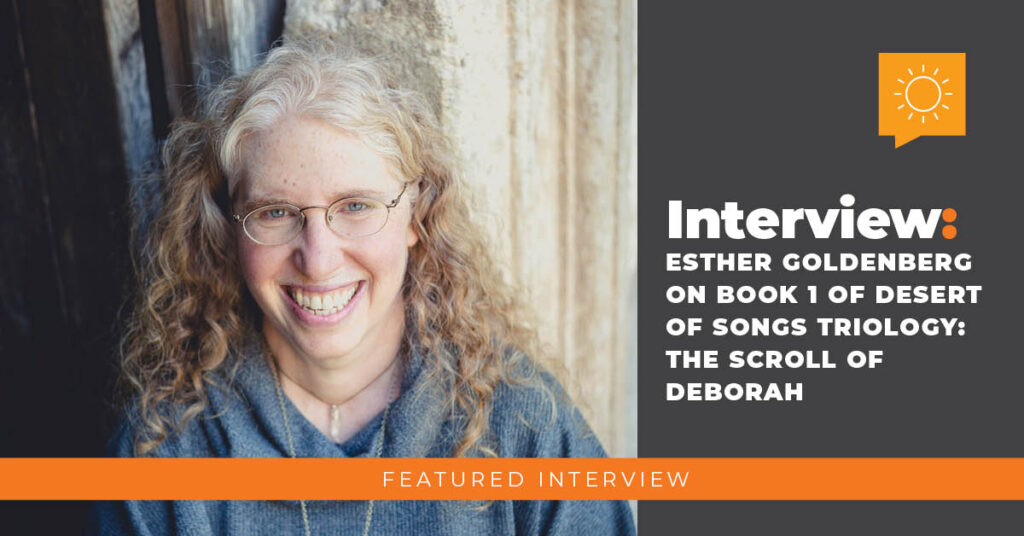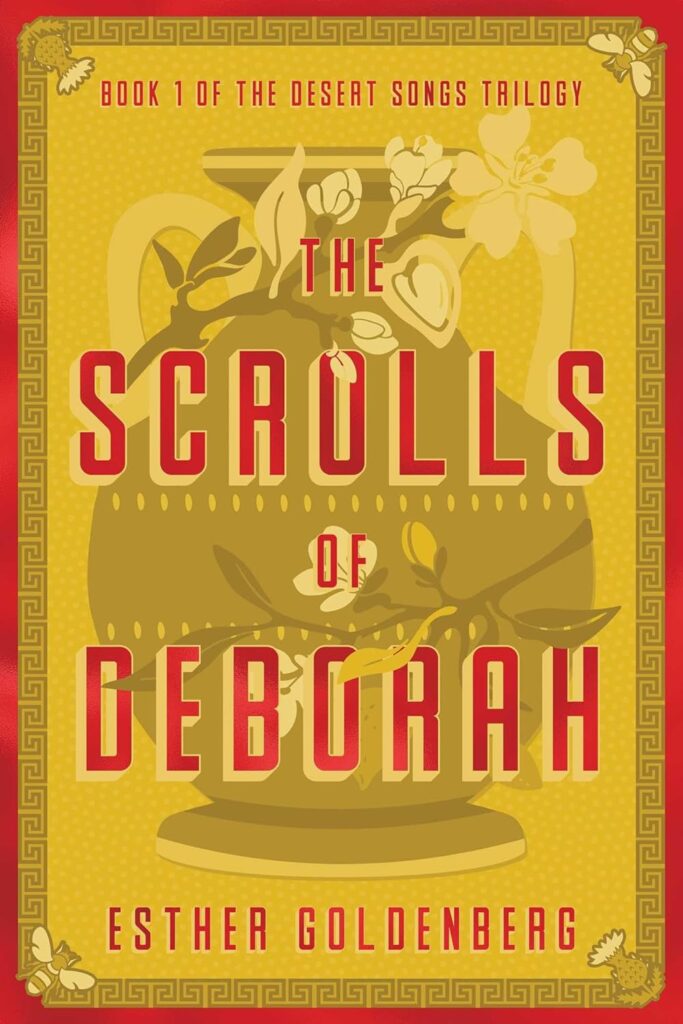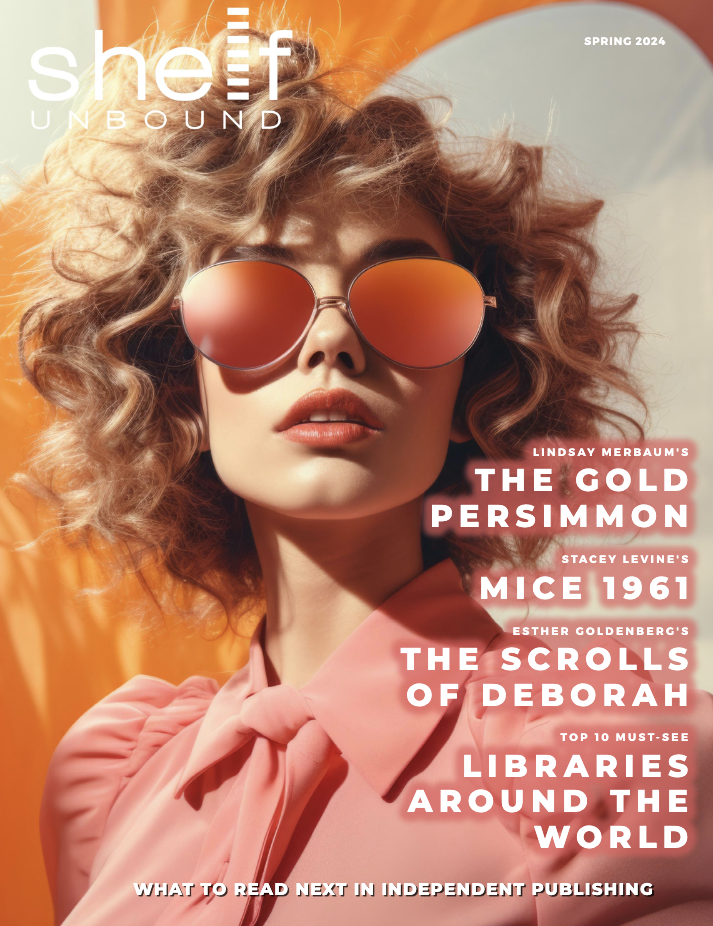By Christina Consolino

Esther Goldenberg is an author, speaker, and educator from Chicago who currently lives in Israel. Along with multiple books for children, her work includes A Story Every Week: Torah Wisdom for Today’s World, which helps readers find relevance in the Torah, and The Out-of-the-Box Bat Mitzvah: A Guide to Creating a Meaningful Milestone, a guide to creating a joyful and significant ceremony. Her most recent work, The Scrolls of Deborah, released in February. Booklist said of the novel, “For any who enjoy a feminist Jewish perspective on the biblical era, this start to Goldenberg’s Desert Songs Trilogy is not to be missed.”
The Scrolls of Deborah is a retelling of the Book of Genesis. Why and how did you choose the Book of Genesis? Where did the original inspiration for the story arise?
EG: I was intrigued by a line in Genesis that mentions the death and burial of Deborah, Rebekah’s nursemaid. I feel that line holds a great mystery. Why write about her death when nothing about her life was mentioned? Who was this woman whose death was recorded in the bestselling book of all time – but not her life? This line sparked a huge curiosity in me. And because she was Rebekah’s contemporary, Deborah and her scrolls give us a peek into the lives of the matriarchs and patriarchs of Genesis.
The novel is the first in The Desert Songs trilogy. Did you always set out to write a series, or did that arise organically? What challenges did you find in writing a series, and how did you work through them?
EG: I initially thought it would be a series of two books. During the creative writing process, it became clearer there would be three books. In writing three books with some overlapping characters, one challenge I faced was to make sure that there was consistency across the longer storyline of the entire series. I haven’t finished writing the third book yet, so it’s easy for me to get a little nervous about what might come up there that needs to be aligned with The Scrolls of Deborah, which is in its final version in print.
A trilogy makes sense, knowing that the number three represents divine perfection in the Bible. The novel is also divided into sections—scrolls—that number seven, another significant biblical number. When in the writing process did you decide on using three and seven? Do those numbers come up again in the text?
EG: Some Biblical numbers that come up in the novels are three, seven, ten, and forty. I’ve always been intrigued by numbers in the bible. I think we use numbers conversationally in ways that wouldn’t make sense to people of different times, or perhaps different cultures. An example is the phrase: “if I’ve told you once, I’ve told you a thousand times.” When saying that, neither the speaker nor the listener thinks that the thing has been said exactly 1,000 times. The number 1,000 is chosen here to emphasize something. Throughout writing The Desert Songs trilogy, whenever I have an opportunity to use a number, I think there’s an opportunity to understand that number as something beyond its numerical value.
The story features Rebekah, wife of Isaac, and Deborah, her nursemaid. Those familiar with the Old Testament might remember Rebekah for deceiving her husband with respect to Jacob, but her actions are also seen as carrying out God’s will. How did you go about crafting Rebekah’s character so that she’s well balanced and engaging, a character who draws readers in despite possible prior biases?
EG: Thank you for that question. When writing Rebekah and all the other characters, one main goal I had was to portray them as more rounded people. There are so few stories about Rebekah in the Bible that it’s easy to think of her only as one thing or another. Maybe as manipulative, or deceitful for her trickery. Maybe as obedient for perpetuating the plan. Whatever it is, it’s a character judgment based on one decision, not on a whole person – someone who made many decisions and took many actions in her life. This exact issue comes up in the book and Rebekah judges herself based on this one decision. I think all too often, we judge ourselves based on one choice, and even more unfortunate, we judge others based on one choice or action or belief rather than looking at the whole person. So when writing the characters, I wanted to tell more than just the stories that stand out. I wanted there to be stories about their daily lives, their joys and likes and dislikes, their challenges and their growth moments. I hope this gives readers the chance to think more about the characters as multifaceted – just like people today.
I love that Deborah is the storyteller because you’ve given voice to a woman who didn’t have much in the original Book of Genesis. Can you comment on that?
EG: Other than her death, there are no stories about Deborah in the Book of Genesis. For me, this left infinite possibilities to my imagination.
On the first page of the story, Deborah is speaking to Joseph, the scribe, saying, These scrolls will be your education—and my legacy. Do you consider this trilogy education for your readers and your legacy?
EG: Writing this trilogy has been educational for me. Connecting with the characters and scenes and the moments in the book has opened my eyes and broadened my experiences of relationships, core values, flora and fauna, and even scents that are ongoing parts of both the past and the present. I hope it will do the same for readers.
Can we talk a little about the word feminist? What does that word mean to you? What do you think feminism looked like in biblical times? What message do you hope to send regarding feminism with this book and the series?
EG: Feminism is the simple idea of men and women having equal rights. I don’t think the men and women of biblical times had equal rights. I don’t write stories that pretend that the women in the books had the same rights as the men, but I’m coming to the table with some stories from a more feminine lens. This is more holistic, encompassing a fuller view of life and tribe, and less linear. I’ll be thrilled if reading The Scrolls of Deborah and The Desert Songs Trilogy opens the readers’ minds to the idea that we never know the whole story, whether that’s a story in a book or a story in someone’s life. Perhaps we can approach these missing pieces with curiosity and compassion.
The book has themes of community and connection and the powerful bond that women can share. What communities have you found connection in? Do any women in particular inspire you and your writing?
EG: I’ve been lucky enough to find wonderful connections in chanting circles and drumming circles, sharing circles, and storytelling circles. I notice these all have circles. I think there’s something very powerful about being able to see each other and know that we’re all pieces of those circles. We’re all connected, we all support each other, and we’re all valuable and vulnerable – and hopefully appreciated. A person who shows up to such a circle with openness and compassion is inspiring.
Writing a novel like this in a patriarchal world can give rise to a plethora of emotions. Have your emotions run the gamut? At any point, did you have any reservations about pursuing publication?
EG: I often have a plethora of emotions. When I do, I try my best to follow the example in the book of taking deep breaths and reminding myself of the interconnectedness of everything. The Scrolls of Deborah offers a non-patriarchal way of experiencing divinity that many people welcome. I felt from the beginning that it would be good to have a team of people – or a tribe of people – to bring this trilogy into the world. As a woman author in 2024, I have the privilege and honor to work with a publishing company that’s raising the volume on too-often silenced voices.
What’s the status of the other books in The Desert Songs Trilogy? Any other projects percolating?
EG: The Scrolls of Deborah is now available in paperback, ebook, and audiobook. Seventeen Spoons is being polished up for release in a matter of months, and I’m still in the process of writing the third book. New projects arise whenever I get to lead workshops and circles that center around the themes in The Scrolls of Deborah. Each circle is like a new project because there are different participants every time. Together we create experiences of wonder, joy, and of course, connection.

The Scrolls of Deborah transports us to the awe-inspiring landscapes of the past and uncovers the intertwined lives of Rebekah, a revered matriarch in Judaism, and her devoted handmaiden Deborah. In this mesmerizing tale, their strength, wisdom, and love take center stage, shaping their destinies amid a world steeped in tribal tradition.
With poignant vulnerability, The Scrolls of Deborah, a work of Biblical fiction and the first installment of the Desert Songs Trilogy, illuminates the hidden stories of these remarkable women, whose pivotal roles have often been overshadowed. Against the backdrop of the desert and the opulence of palaces, the narrative weaves a tapestry of captivating tales. Each page reveals stories filled with heartbreak and inspiration, leaving an indelible mark on the very fabric of religious thought.

Continue Reading…
Article originally Published in the March / April / May 2024 Issue: Indie in Bloom.
